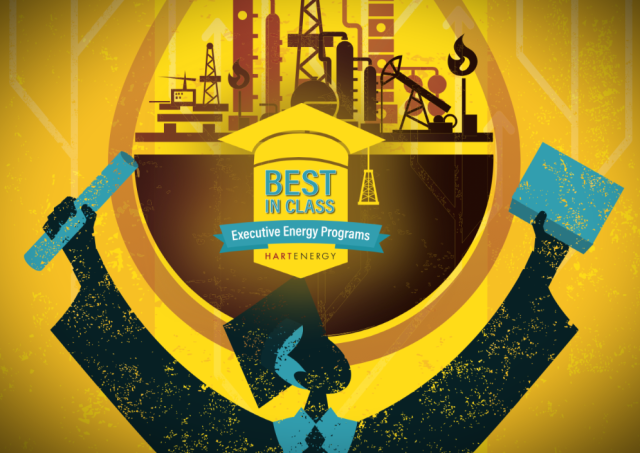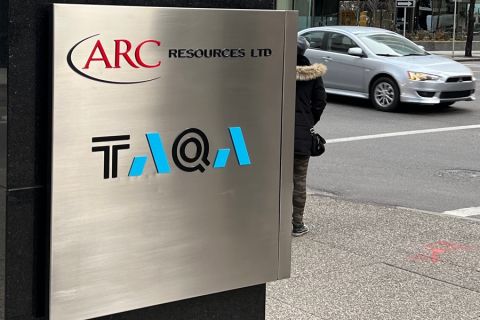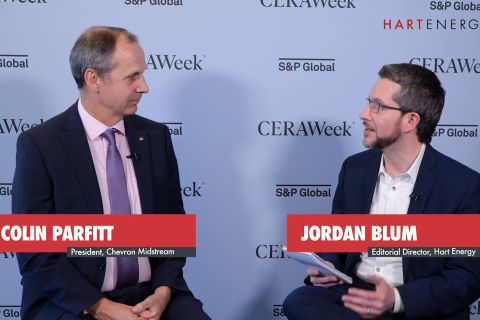
(Source: Hart Energy)
[Editor's note: A version of this story appears in the February 2020 edition of Oil and Gas Investor. Subscribe to the magazine here.]
As February begins, all oil and gas executives find themselves immersed in first-quarter operations, but a smaller, though growing, number of them also manage a separate set of tasks and challenges: the coursework for specialized graduate degrees, such as an Executive MBA in Energy or MS in Energy Management. Programs offering such degrees have lately surged in popularity for myriad reasons, with many students citing their flexible, hybrid course formats and emphasis on specific knowledge that can be applied directly to an already existing career.
Though these programs vary widely, their directors and alumni have consistently found that completing one of these specialized programs, or an MBA track that caters to energy, can tangibly improve an executive’s career trajectory. In fact, the unique characteristics of the oil and gas industry make it possible for the industry’s executives to more extensively benefit from these specialized degree programs.
Dipankar Ghosh, executive director of The University of Oklahoma’s Energy Institute and founder of its Executive MBA in Energy program, explained, “While all executive MBA [EMBA] programs have their benefits, those students coming from industries undergoing changes are the ones who are most likely to benefit from a specialized EMBA by providing a more specialized management skill set and preparing them to be leaders through the transitional years. Energy is an example of such an industry. It is also a particularly complex and unique industry. Thus, a specialized EMBA to train professionals working in energy to take on the mantle of leadership in that industry makes a lot of sense.”
These programs dispel the myth that academia exists solely within an ivory tower, that universities cannot keep pace with the rapidity of business. Because of their small size and industry-staffed advisory boards, they can regularly review and redesign their curriculum to address shifting markets, technologies and social conditions; some of them, such as the University of Colorado Denver MS in Global Energy Management (GEM) program, allow executives to sit in on classes at any point post-graduation to remain up to date.
Sarah Derdowski, executive director of CU Denver’s GEM program, said, “Energy changes literally quarter to quarter, so if students want to come back, we offer lifelong learning. The industry is going to change, but we’re here for you.”
RELATED: Executive Energy Programs: Top 15 Energy Graduate Programs
A false dichotomy
Regardless of the degree offered, be it an MBA or a technical master’s degree, all of these programs bring experienced individuals from varied energy disciplines—engineering, finance, information systems, you name it—into collaborative learning environments designed with input from senior industry personnel (and sometimes taught by them) to create microcosms of the industry at large. They allow students to share real issues drawn from their present work experiences and leave the classroom with new solutions to test in the office or field. This facilitates crosstalk that bridges the oft-described dichotomy between studying and working, theory and practice.
Stephen Molina, director of the MS in Energy Management program at The University of Texas at Dallas, illustrated this learning environment with an example from an energy economics course, in which he brought in senior executives to discuss project funding. “I told them, ‘dust off the last presentation you made to lenders in the Northeast, and I want you to give the exact same presentation you gave. I want you to sell yourself, your company and your project to the students. Make the pitch to them, just like they’re your investors. You’ll be surprised at the questions you get.’”
The energy courses in Molina’s curriculum draw their material entirely from actual energy contracts and agreements, many of them international. “We took a really practical approach,” Molina said. “I’m not a professional professor, I like to remind the students; I don’t have a Ph.D., and I haven’t read a lot of books about this. I’ve actually done it. I like to tell students that I’m bringing in speakers that the books were written about.”
More so than in a typical MBA program, the ability to evaluate actual business situations is necessary for these programs to engage students, as many cohort members have a decade or more of industry experience, with some already in executive roles.
“Executives, they’re opinionated. They want to hear the war stories,” Derdowski said. “You [an instructor] can’t just say ‘I’m the expert, this is how it is.’ That doesn’t work anymore. Professors don’t immediately have credibility like they used to, and students want to know what you did, when you did it, how it affected the industry, and then maybe they’ll trust you and think you have something to provide for them.”
Derdowski typically hires adjunct faculty who have the ability to remain involved beyond academia. “Tenure-track faculty are obviously still important on the research side,” she said. “But people want more applied learning, and so you’re seeing more part-time faculty [and] instructors still working in the industry to stay in tune with the industry.” Other programs, such as Molina’s and Ghosh’s, follow a similar path, balancing instructors with academic and industry-specific backgrounds.
Think of the big picture
However, when practical education is pushed too far, you run the risk of missing the forest for the trees, and that is why these programs cultivate a holistic understanding of the industry. Rather than diving into the weeds of a specific sector, topic-specific courses, such as energy finance or strategic decision-making, draw examples from myriad sectors to illustrate the overarching strategic factors, thought processes and behavioral patterns that executives must consider in any business environment. For example, a case study of a midstream deal may be used to illustrate how to evaluate an acquisition in the upstream, or vice versa.
Explaining how the EMBA program maintains a big-picture awareness, Ghosh said the classes largely break down into “tool classes and concept classes.” The tool classes tend be more specialized and skillset focused, such as electric utility fundamentals, while the concept classes are more abstract and synthetic, such as global perspectives in energy. The latter classes synthesize ideas from across disciplines and the globe, which Ghosh considers essential to developing a holistic understanding. Together, the tool classes and concept classes, the applied and abstract, create an intellectual approach to the business of energy.
Derdowski said that the CU Denver GEM program requires its students to complete some technical energy science classes, taught by faculty from the school of engineering, and explained this is part of the balancing act of specialized and big-picture knowledge in the GEM program’s curriculum. “We tend to pull out pieces that are more specialized, and a lot of other schools do to, to focus on business acumen and managerial expertise. However, we highlight the importance of things such as data analytics or AI [artificial intelligence]. We show that this is one of your tools in your tool chest.
“I think that would speak to the broader executive energy education,” she continued. “We want students to be flexible, nimble, to oversee multiple departments and have the skillset to ask the right questions or know who their go-to people are in each key area.”
Breaking down silos
Oil and gas has traditionally been a highly siloed industry. Those involved in technical efforts such as geology or engineering typically do not enter the world of finance or business development. However, these programs encourage the simultaneous advancement of technical and nontechnical skillsets.
Ghosh said, “A VP of engineering … can benefit from a better understanding of finance, valuation, organizational behavior, strategy, etc. On the other hand, a CFO will know all the nuances of accounting and finance, but to be an effective decision-maker at the organizational level, a broader perspective about the industry and the company would be beneficial via topics such as strategy, use of big data, legal, policy and so on. And both can benefit from developing a global mindset, which we address via our international module in Amsterdam and London.”
The ability to understand both sides of the industry improves executives’ competitiveness in these volatile times, and with the transitions ahead for the industry, the need for such an edge will only become more acute, making “a platform for life-long learning … a must for all,” Ghosh said.
For executives on management teams at smaller or leaner companies, the interdisciplinary nature of these graduate programs is especially pertinent. Limits to human resources and fewer obstacles to career development often encourage individuals who can effectively communicate and strategize across multiple disciplines to attain greater responsibilities.
This has certainly been the case with John Argo, vice president of business development at Continental Resources Inc. and one of the first graduates of The University of Oklahoma’s EMBA program.
With a bachelor’s degree in petroleum engineering, Argo quickly moved through various engineering roles in the industry, all with progressively increasing responsibilities. By the time Argo was 27, he was in his first management role at HighMount E&P, a small independent oil and gas producer. At HighMount, he noticed that those on his senior leadership team with both technical and financial experience contributed most effectively to the overall company vision, strategy and success. This observation proved critical to Argo’s leadership path.
“At each level of my career, I have never wanted to be held back by limits to my own knowledge or understanding. This was a major reason why I thought an MBA would be a critical complement to my technical background. I believe you have to be familiar with all aspects of your business in order to effectively lead a successful organization,” Argo said.
After aiding HighMount’s divestiture process in the fall of 2014, Argo joined Continental Resources as engineering manager of business development. “I was excited to join a best-in-class operator but also to take a position that accelerated my professional growth. Business development was not my background, but I had enjoyed my role in HighMount’s divestiture and was getting my MBA at the time,” he said. “The combination of Continental leadership’s financial and strategic knowledge along with the projects I worked provided me with relevant, real-time experience with the concepts, classwork and discussions we were having This all helped me accelerate the leverage of the EMBA program to my career.”
Executive Q&A
Even so, it’s reasonable for any executive to ask: “Is this really for me?” Advantages in curriculum content and approach, in course format and quality of peers, all of these perks aside, there’s no denying these programs are difficult—and executives deal with plenty of challenges already in any given business day.
Before enrolling in CU Denver’s GEM program, Mike Wracher, CEO of Beacon West Energy Group LLC, a California-based oil and gas asset management company, wrestled with that very question, wondering if the program was a good fit or worth the possible costs.
At that time, Wracher had just been promoted to vice president at Venoco Inc., an E&P that operated in California’s Monterey Formation, and he felt he had his hands full. He wondered, “How is this going to help me in my career? I’ve gotten to where I wanted to be, as VP of an exploration company. Is [this program] going to take away from my focus on my new job?’”
Similar concerns kept Argo from enrolling in a traditional MBA program, which “required two and half years away from work. I didn’t want to lose two and a half years of my career path,” he said. So as Argo evaluated the various specialized degree programs that existed, none were as compelling to him as The University of Oklahoma program, which began in 2014.
Program directors are keenly aware of these questions, too. As Derdowski said, “the ROI [return on investment] demand of students is pretty strong.” Or Molina, “Graduate students are serious about it. They have their eye on the ball, their career, they’re aggressive, ambitious and they work very, very hard,” and that means they will not settle for programs that leave few options to accommodate their career development.
The hybrid education model of many of these programs has been critical to helping students maintain their career paths. In these models, students may take many, if not all, of their classes online, via recorded lectures, live digital learning environments and myriad other web resources. These features allow students to work from anywhere in the world, often at their own pace and on their own time.
The hybrid format’s flexibility helped Argo, with three young children at the time, when HighMount’s parent company elected to market the subsidiary shortly after he began the EMBA program. “My job went from 60 hours a week to, at times, over 20 hours a day. It was very intense, from April through August, when we ultimately signed the PSA [purchase and sale agreement],” he said. “The flexibility of the online environment was an important aspect that allowed me to continue the program during an arduous time.”
And though students often communicate via digital means during these programs, the small cohort size and frequent team-based learning objectives create strong relationships that mutually develop students.
“When you end up in a cohort, you’re with people from all different parts of the oil and gas business, and you get perspectives from all these people outside the sweet spot of your career. It makes everything more human,” Wracher said. “You have a great group of colleagues you can discuss issues with.”
The ROI of higher ed in energy
All told, Wracher and Argo consider graduate education in energy to have been a valuable addition to their careers, well worth the initial investment of material and mental resources.
Though he’d already been in management for some time before earning his graduate degree, Wracher said that the “GEM program broadened my horizons quite a bit. It filled in and buttressed my more than 20 years in the industry. It gave me more confidence in managing the disparate pieces of the business.”
The acumen gained through CU Denver’s GEM program in part helped Wracher, along with his partners, successfully start his present company after Venoco’s bankruptcy, as he now manages assets that Venoco formerly owned, having won the bids for the company’s operations thanks, in part, to a reputation for efficient and safe leadership.
Argo also affirmed his education, “Bottom line, [the EMBA program] allowed me to take a more macro and strategic perspective.”
He also added an important qualification: “You shouldn’t expect incremental responsibility and opportunities because you’ve done this, you are more likely to receive incremental responsibility because you have demonstrated that you can handle it.
“If people have the right motivation [when completing these programs] for self-improvement, I think those other benefits will come in time,” he said.
Recommended Reading
ARC Resources Adds Ex-Chevron Gas Chief to Board, Tallies Divestments
2024-02-11 - Montney Shale producer ARC Resources aims to sign up to 25% of its 1.38 Bcf/d of gas output to long-term LNG contracts for higher-priced sales overseas.
Tinker Associates CEO on Why US Won’t Lead on Oil, Gas
2024-02-13 - The U.S. will not lead crude oil and natural gas production as the shale curve flattens, Tinker Energy Associates CEO Scott Tinker told Hart Energy on the sidelines of NAPE in Houston.
Exclusive: Chevron Balancing Low Carbon Intensity, Global Oil, Gas Needs
2024-03-28 - Colin Parfitt, president of midstream at Chevron, discusses how the company continues to grow its traditional oil and gas business while focusing on growing its new energies production, in this Hart Energy Exclusive interview.
US Natgas Prices Hit 5-week High on Rising Feedgas to Freeport LNG, Output Drop
2024-04-10 - U.S. natural gas futures climbed to a five-week high on April 10 on an increase in feedgas to the Freeport LNG export plant and a drop in output as pipeline maintenance trapped gas in Texas.
Liberty Energy CEO: NatGas is Here to Stay as Energy Transition Lags
2024-03-27 - The energy transition hasn’t really begun given record levels of global demand for oil, natural gas and coal, Liberty Energy Chairman and CEO Chris Wright said during the DUG GAS+ Conference and Expo.




